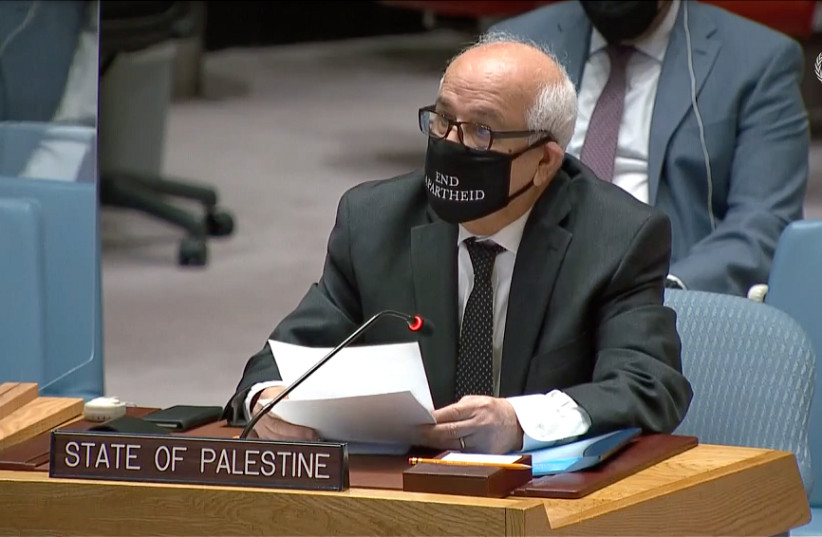Moves by NGOs and parts of the UN to define Israel as an apartheid state under international law ignore the dynamism of the country’s Supreme Court, the specifics of the law, and other complex realities, according to a report by NGO Monitor.
Authored by British Barrister Joshua Kern and NGO Monitor Legal Advisor Anne Herzberg, the report analyzes a vast array of legal issues wrapped up in the Israeli-Palestinian conflict.
The goal of the report is to unpack what “apartheid” means as a crime in concrete legal terms as opposed to its colloquial and political uses, and to show its inapplicability to Israeli-Palestinians disputes.
The report is the second in a series after an initial review in December. Both follow an increased campaign by NGOs and certain UN officials to apply the “apartheid” label to Israel not only in political discourse but in lobbying the International Criminal Court to charge Israelis with this crime.
“Apartheid is a grave accusation, but claims of apartheid have been made imprecisely and casually by many NGOs,” the report says. “The definition of apartheid is untested in international law as no court has yet examined the crime, and there is comparatively little legal writing available.”

NGO Monitor views its two reports as an opportunity to address “this legal vacuum,” providing “a full analysis grounded in international law of the elements of apartheid as a crime against humanity.”
Many groups have called the Jewish Nation-State Law proof of Israeli apartheid. NGO Monitor pointed out that such a view ignores the careful analysis applied to the law by the Israeli Supreme Court.
“The Law should be interpreted consistent with the other Basic Laws and with the principles and values of the [Israeli] legal system,” a 10-1 majority of the court determined, and that the Basic Law “is a chapter of Israel’s emerging constitution designed to enshrine the state’s identity as a Jewish state, without detracting from the state’s democratic identity anchored in other Basic Laws and constitutional principles in the system.”
The judgment noted that the “principle of equality is a fundamental principle” in Israeli law, and “equal rights are granted to all citizens of the state, including minority groups, which form an integral part of the state’s fabric.”
Although the majority considered that it would have been “better” if the principle of equality had been explicitly included in the Basic Law, the justices clarified that it not being included in the law “does not detract from the principle [of equality]’s status and importance as a foundational principle in our legal system.”
Directly confronting allegations that the law illegally discriminates between Israelis and Palestinians regarding land ownership, the court wrote that “the value of Jewish settlement enshrined in Section 7 [of the Nation-State Law] can be realized alongside the value of equality,” and “is not intended to legalize the discrimination and exclusion of non-Jews from state lands, as even clarified by the State.”
Noting that Justice George Kara dissented, NGO Monitor makes clear that even his arguments were about substantive technical issues and nothing near the crime of apartheid.
NGO Monitor also analyzed objections to Israel’s Law of Return, saying that it “does not provide for ‘Jewish preferential citizenship,’ nor does it make the citizenship of non-Jews in any way inferior. Its provisions are consistent with international norms.”
The report said that in its Ka’adan decision, the Supreme Court found that the Law of Return does not discriminate between different categories of citizens within the State of Israel, but provides “a special key to enter the house” of Israel. “Once somebody is in the house as a citizen under the law, he enjoys equal rights, just like all the other members of the household.”
NGO Monitor said that the law is intended to offer Jews around the world safe haven, but does not provide for “Jewish preferential citizenship” nor make the citizenship of non-Jews inferior. It is directed toward the Jewish Diaspora.
The report cited scholars who argue that considerations of corrective justice “create a justified exception to the principle of equality,” such as giving Jews a safe haven after the Holocaust and following pogroms in Middle Eastern and North African countries.
For example, Germany in the 1950s expanded the right to automatic citizenship to all ethnic Germans from the Soviet Union or Eastern Europe, and in 1996, Finland amended its “Foreigners’ Law” to confer residency status on ethnic Finns who came to Finland from the Soviet Union. The report said there is a distinction between ethnicity, national identity, and citizenship in the constitutions of Poland, Ireland and Armenia.
In addition, the report looks at the existing territorial and political divisions among Palestinians, “demonstrating that this separation does not result from an Israeli policy of ‘domination’ and ‘fragmentation,’ but rather from geopolitical factors affecting the history of the conflict, such as Arab rejectionism, the 1947 UN Partition Plan, Jordanian and Egyptian control over the West Bank and Gaza respectively, the Oslo Accords, and Palestinian political splits.”
Finally, the report acknowledges that Israel, like other democracies, can improve in fighting discrimination against Israeli-Arabs or Palestinians, and suggests concrete recommendations such as establishing a new center focused on the issue.
